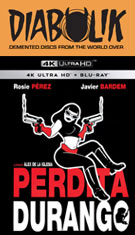
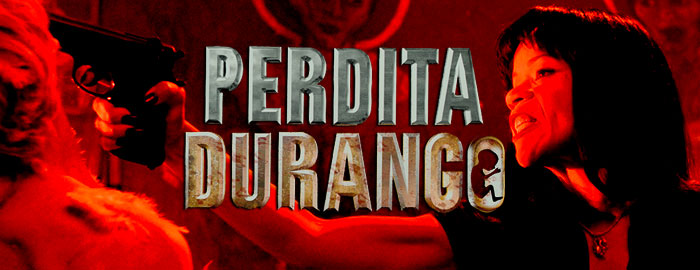
Color, 1997, 129 mins. 57 secs.
Directed by Álex de la Iglesia
Starring
Rosie Perez, Javier Bardem, James Gandolfini, Don Stroud, Aimee Graham, Alex Cox
Severin Films (UHD, Blu-ray & DVD) (US R0 HD), Mercury Film (Blu-ray) (Spain R0 HD), Koch Media (Blu-ray & DVD) (Germany RB/R2 HD/PAL), Metrodome (DVD) (UK R2 PAL), A-Pix (DVD) (US R1 NTSC), Cecchi Gori (DVD) (Italy R2 PAL) / WS (2.35:1) (16:9)
Originally intended to be an international  calling card for its director and a key entry in the hip crime wave of the late 1990s, this ferocious adaptation of the novel/comic 59 Degrees and Raining: The Story of Perdita Durango by Barry Gifford (Wild at Heart) went through countless distribution
calling card for its director and a key entry in the hip crime wave of the late 1990s, this ferocious adaptation of the novel/comic 59 Degrees and Raining: The Story of Perdita Durango by Barry Gifford (Wild at Heart) went through countless distribution  and legal transformations on its way to the U.S. three years later. As jittery and confrontational as director (and onetime comic book artist) Álex de la Iglesia's previous two films, Accion Mutante and Day of the Beast (long before he went on to projects like 30 Coins and Witching and Bitching), this gritty and very effective blend of brutal crime antics and dark comedy finds its creator honing his craft thanks to a sharp script partially written by Gifford himself.
and legal transformations on its way to the U.S. three years later. As jittery and confrontational as director (and onetime comic book artist) Álex de la Iglesia's previous two films, Accion Mutante and Day of the Beast (long before he went on to projects like 30 Coins and Witching and Bitching), this gritty and very effective blend of brutal crime antics and dark comedy finds its creator honing his craft thanks to a sharp script partially written by Gifford himself.
Near the United States-Mexican border, fiery hellcat Perdita (Perez in one of her best performances) hooks up with Romeo Dolorosa (Bardem). A mystical, demonic criminal and cult practitioner, he talks her into a sacrificial road trip involving a young American couple as hostages and blood offerings. Simultaneously carrying out orders by crime boss Santos (Stroud) to smuggle fetuses for the black market cosmetics industry, Romeo is also pursued by dogged DEA agent Dumas (The Sopranos' Gandolfini) all the way to that hotbed of perdition, Las Vegas.
The excellent ensemble cast here relies on Perez for its star power but also provides a showcase for a nearly unrecognizable Bardem, making a head-spinning switch from his earlier,  more sensitive roles in Jamón Jamón and Live Flesh. Aimee Graham (yes, Heather's sister) plays one of the hostages and is clearly game for whatever the script throws at her, while supporting roles include some surprising faces like British director
more sensitive roles in Jamón Jamón and Live Flesh. Aimee Graham (yes, Heather's sister) plays one of the hostages and is clearly game for whatever the script throws at her, while supporting roles include some surprising faces like British director  and spaghetti western enthusiast Alex Cox. Incidentally, the characters of Perdita and Santos also appeared in both the novel and film of Wild at Heart, which means you can program this as a kind of odd semi-sequel to the David Lynch film.
and spaghetti western enthusiast Alex Cox. Incidentally, the characters of Perdita and Santos also appeared in both the novel and film of Wild at Heart, which means you can program this as a kind of odd semi-sequel to the David Lynch film.
Inexplicably retitled Dance with the Devil and sporting a video generated title card for its U.S. release from short-lived label A-Pix (who tried to go for major cult cred with this and Argento's Phantom of the Opera), Perdita Durango was given a messy rollout on DVD with a heavily edited R-rated version for some rental markets and an "unrated director's cut," which was complete in terms of violence but lost some pivotal other footage along the way-- most significantly a climactic sequence in which Romeo finds himself literally interacting with the film Vera Cruz, his heroic ideal. While this loss due to the film's legal restrictions doesn't necessarily harm the narrative flow, it does remove the emotional punchline for his character and sacrifices one of Iglesia's more interesting stylistic innovations in the film. The German DVD (packaged with a nice Milan CD of Simon Boswell’s score) was the first truly complete one and sported a 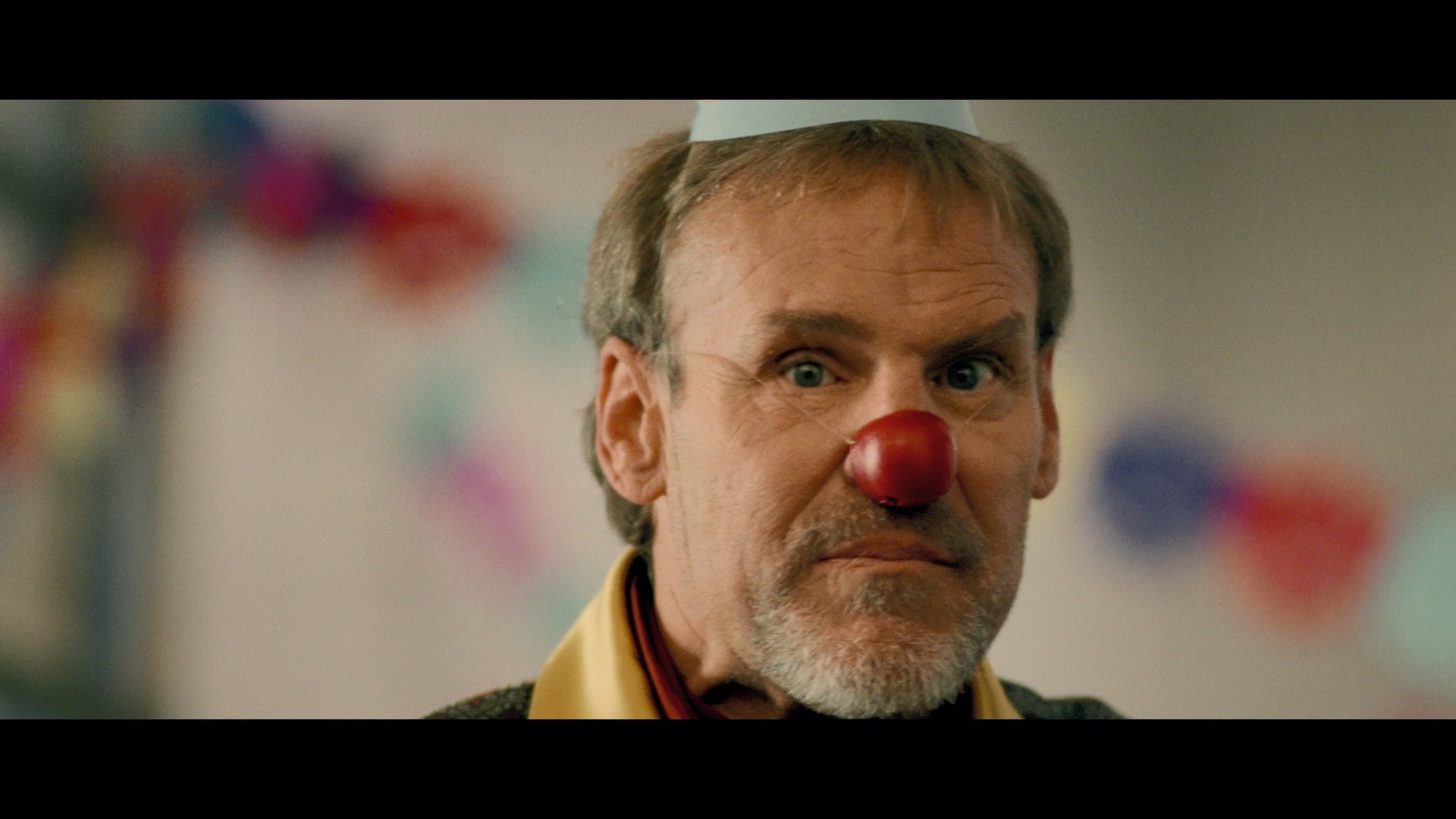 beautiful anamorphic transfer; the only debit is the English subtitles must be manually switched on and off during the Spanish language scenes or left on for the film’s entirety. The Dolby Digital mix
beautiful anamorphic transfer; the only debit is the English subtitles must be manually switched on and off during the Spanish language scenes or left on for the film’s entirety. The Dolby Digital mix  for either version is a real room shaker, with the thunderous Latin-flavored score simmering from every speaker throughout the film. The U.S. disc features optional English subtitles which turn on by default for the Spanish language sequences, as well as a Spanish subtitle option. The original excellent European and Mexican trailers are included, as well as the less impressive video trailer (which "introduces" Bardem for some reason). The German disc also includes optional German subs, a photo gallery, cast bios, and the German and English language trailers, as well as a striking cover. A more stripped-down U.K. version eventually turned up complete from Metrodome after some BBFC wrangling during the original release, and an Italian DVD straggled along later as well.
for either version is a real room shaker, with the thunderous Latin-flavored score simmering from every speaker throughout the film. The U.S. disc features optional English subtitles which turn on by default for the Spanish language sequences, as well as a Spanish subtitle option. The original excellent European and Mexican trailers are included, as well as the less impressive video trailer (which "introduces" Bardem for some reason). The German disc also includes optional German subs, a photo gallery, cast bios, and the German and English language trailers, as well as a striking cover. A more stripped-down U.K. version eventually turned up complete from Metrodome after some BBFC wrangling during the original release, and an Italian DVD straggled along later as well.
The first Blu-ray release of this film turned up in Spain in 2016 from Mercury Film, looking pretty solid with the usual English 2.0 track but no subtitles for the occasional short scenes in Spanish. The first complete English-friendly option came along in 2021 from Severin Films, available as a UHD and Blu-ray set, a standalone Blu-ray, a DVD, or part of a "Day of the Bundle" pack or a March 2021 UHD/Blu-ray bundle. The UHD looks the best of the bunch, as you'd expect, with a far finer representation of film grain here that goes a long way to alleviating that chunky, grungy veneer seen on other transfers; the HDR grading also gives the golds and oranges a particularly vivid pop here that's pleasing throughout. Some of the film was deliberately stylized (intentionally 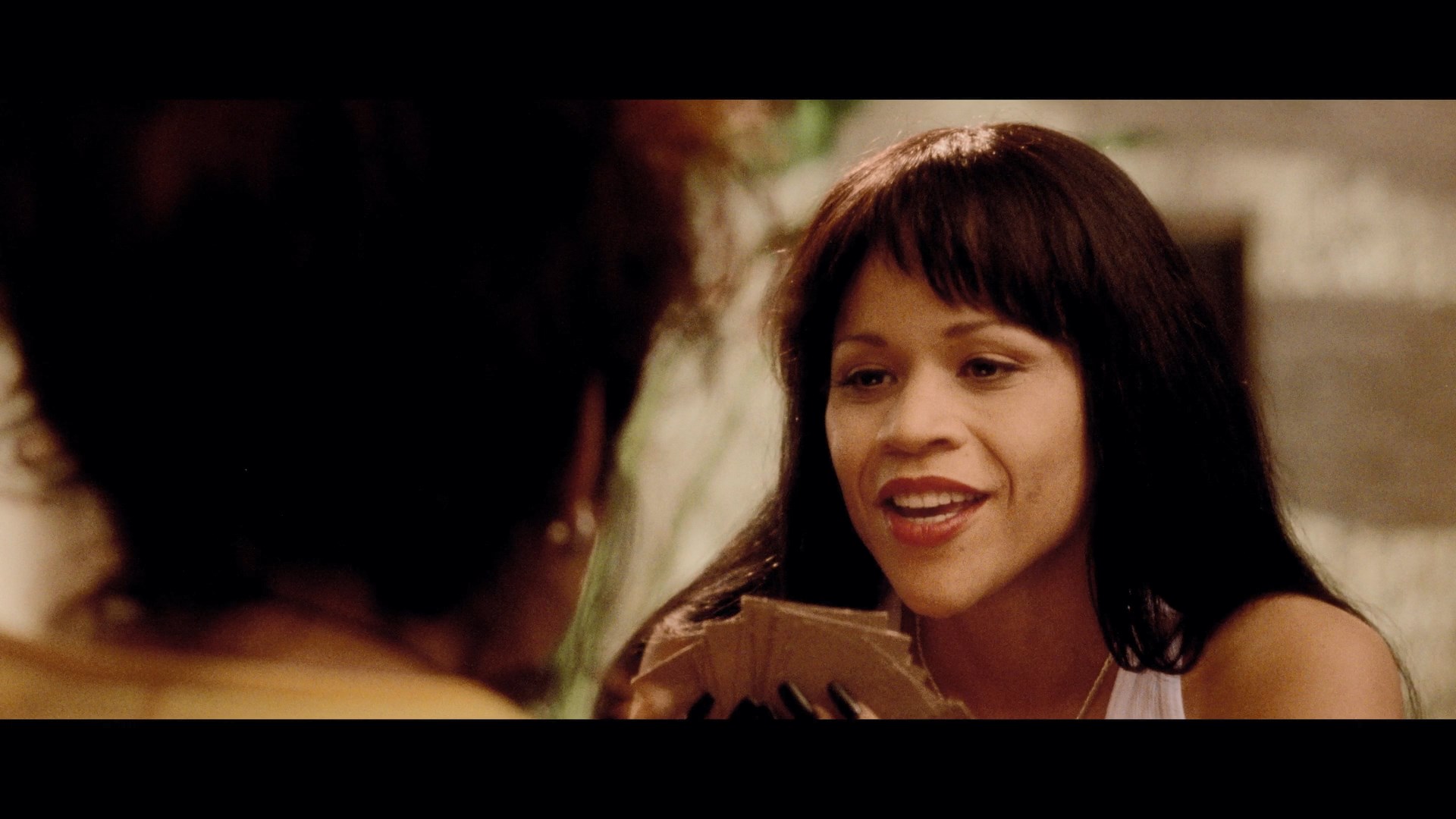 saturated, comic-style colors and frequently heavy contrast) with some extreme focus shifting and intentional softness in some parts of
saturated, comic-style colors and frequently heavy contrast) with some extreme focus shifting and intentional softness in some parts of 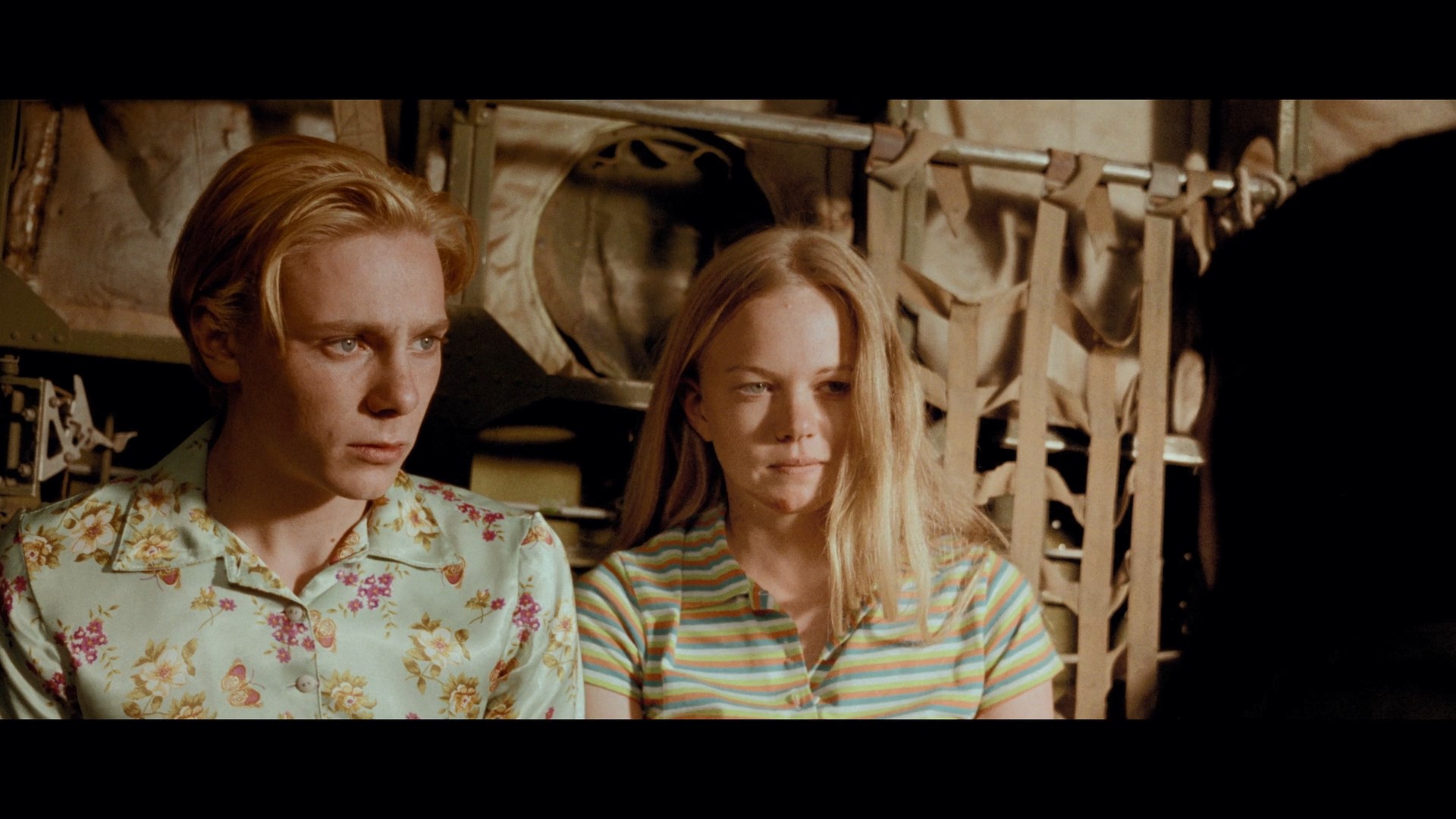 the frame, so that's not a debit of the transfer. The Blu-ray is no slouch either, sporting richer colors than the Spanish disc and also looking less processed by comparison. The framing shifts a bit throughout by comparison on the horizontal edges, but only to a very minimal degree. The standard English track is presented in a very robust DTS-HD MA 5.1 mix with English subtitles for the Spanish-language scenes, plus English SDH subtitles and an alternate Spanish track (also DTS-HD 5.1). Both the UHD and Blu-ray contain two trailers, with the Blu-ray housing the rest of the bonus features. In "On the Border" (28m12s), de la Iglesia looks back on the film from its inception (originally to be directed by Bigas Luna with a heavier political bent) through the process of scouting and then shooting, including some fun stories about the cast (with some choice bits about Gangolfini and Cox). "Writing Perdita Durango" (16m43s), Gifford explains the process of how the story came out of his "dark subconscious" after Wild at Heart with the Perdita character necessitating her own book, a process that led to his involvement in ushering it to the big screen with a friendship forming with Luna (who brought in
the frame, so that's not a debit of the transfer. The Blu-ray is no slouch either, sporting richer colors than the Spanish disc and also looking less processed by comparison. The framing shifts a bit throughout by comparison on the horizontal edges, but only to a very minimal degree. The standard English track is presented in a very robust DTS-HD MA 5.1 mix with English subtitles for the Spanish-language scenes, plus English SDH subtitles and an alternate Spanish track (also DTS-HD 5.1). Both the UHD and Blu-ray contain two trailers, with the Blu-ray housing the rest of the bonus features. In "On the Border" (28m12s), de la Iglesia looks back on the film from its inception (originally to be directed by Bigas Luna with a heavier political bent) through the process of scouting and then shooting, including some fun stories about the cast (with some choice bits about Gangolfini and Cox). "Writing Perdita Durango" (16m43s), Gifford explains the process of how the story came out of his "dark subconscious" after Wild at Heart with the Perdita character necessitating her own book, a process that led to his involvement in ushering it to the big screen with a friendship forming with Luna (who brought in  Bardem, of course) and the interim also leading to a potential directing job for
Bardem, of course) and the interim also leading to a potential directing job for 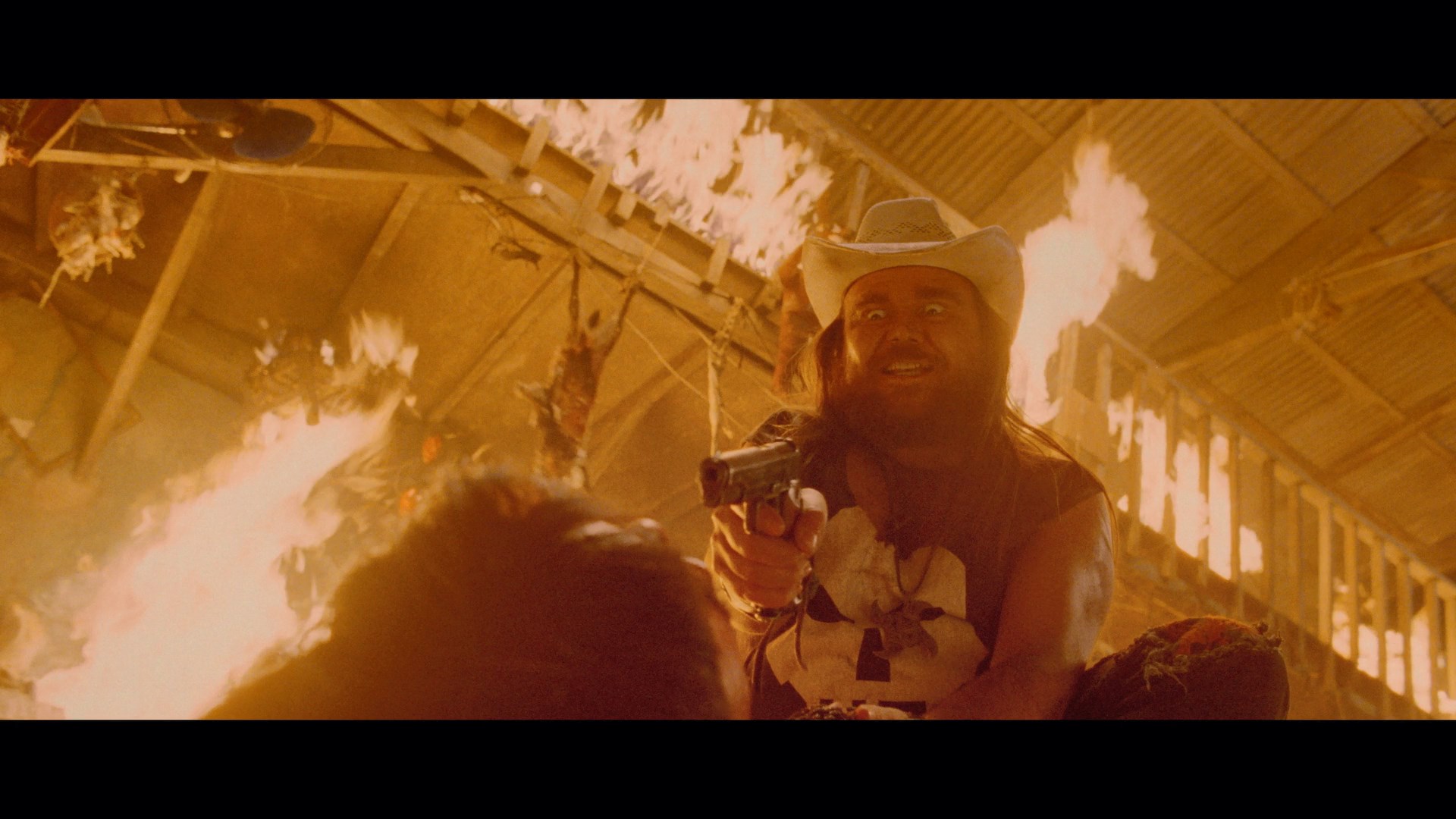 Pedro Almodóvar. Interestingly, he also notes how going back and adhering closely to the book may have been a mistake in the long run, and he shares an interesting peek in how the most memorable song in the film came about. In "Dancing with the Devil" (12m57s), Rebekah McKendry waxes enthusiastic about de la Iglesia's cinema and how this film fits in with his unusual, frequently violent genre-twisting approach. "Necrosatanicos: Perdita Durango and the Matamoros Cult" (18m14s) with Abraham Castillo Flores and Cauldron of Blood author Jim Schutze is quite illuminating as it examines how real religious practices were distorted into a real, notorious 1989 crime fueled by black magic and drug use that influenced the storyline. It's a wild, disturbing story complete with some video coverage of the actual incident. Longtime genre favorite composer Simon Boswell turns up in "Canciones de Amor Maldito" (21m13s) to relate how his early work for Dario Argento and Michele Soavi led to him getting the gig on this film, with a trip to Madrid leading to the creation of the effective score. His bit about the reasoning behind that very familiar Herb Alpert tune is great, too. Finally, "Shooting Perdita Durango" (4m54s) is a quick chat with director of photography Flavio Labiano about approaching the shooting conditions in Mexico versus the United States.
Pedro Almodóvar. Interestingly, he also notes how going back and adhering closely to the book may have been a mistake in the long run, and he shares an interesting peek in how the most memorable song in the film came about. In "Dancing with the Devil" (12m57s), Rebekah McKendry waxes enthusiastic about de la Iglesia's cinema and how this film fits in with his unusual, frequently violent genre-twisting approach. "Necrosatanicos: Perdita Durango and the Matamoros Cult" (18m14s) with Abraham Castillo Flores and Cauldron of Blood author Jim Schutze is quite illuminating as it examines how real religious practices were distorted into a real, notorious 1989 crime fueled by black magic and drug use that influenced the storyline. It's a wild, disturbing story complete with some video coverage of the actual incident. Longtime genre favorite composer Simon Boswell turns up in "Canciones de Amor Maldito" (21m13s) to relate how his early work for Dario Argento and Michele Soavi led to him getting the gig on this film, with a trip to Madrid leading to the creation of the effective score. His bit about the reasoning behind that very familiar Herb Alpert tune is great, too. Finally, "Shooting Perdita Durango" (4m54s) is a quick chat with director of photography Flavio Labiano about approaching the shooting conditions in Mexico versus the United States.
Severin Films (Blu-ray)

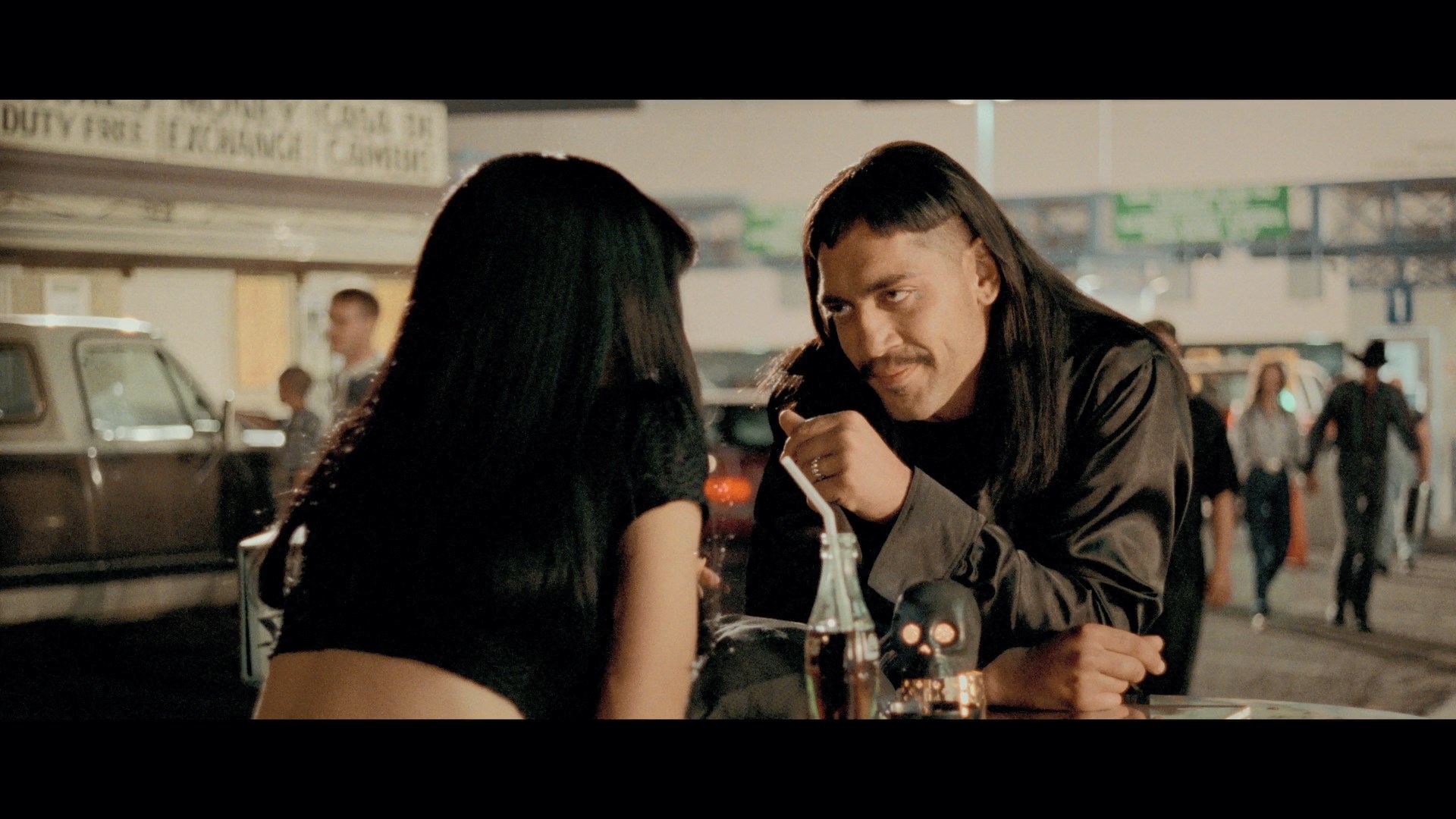



Mercury Film (Blu-ray)
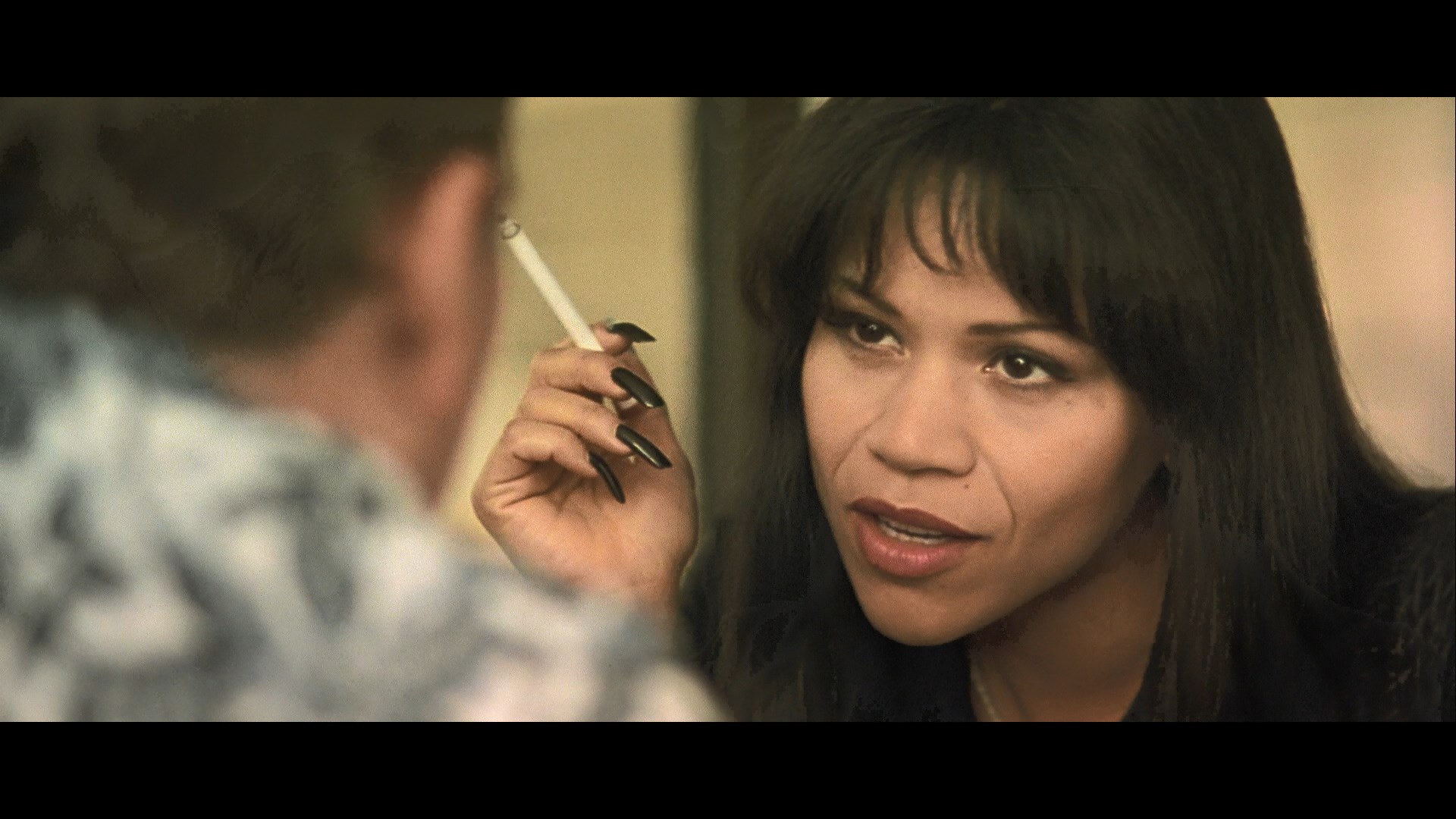
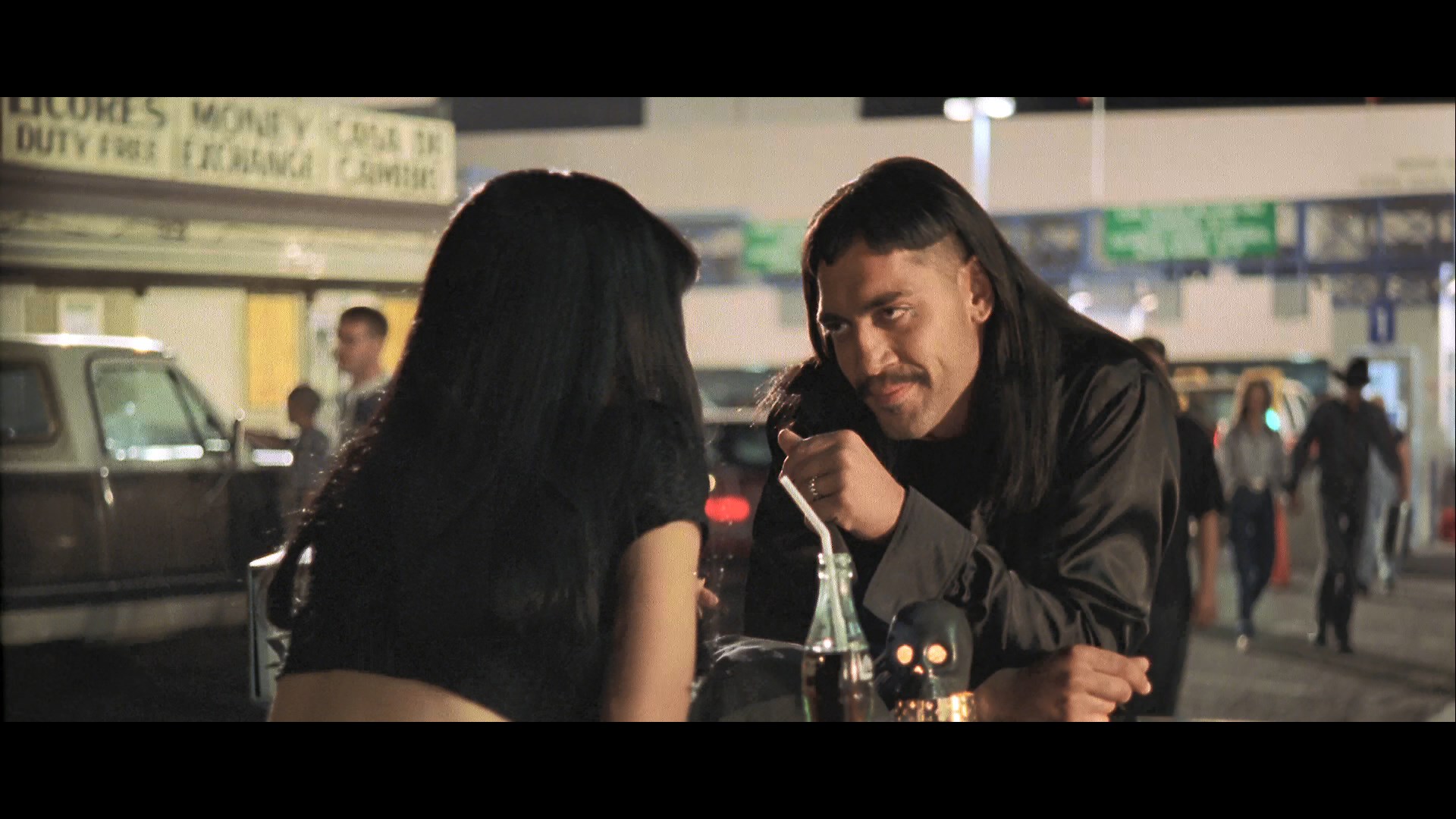

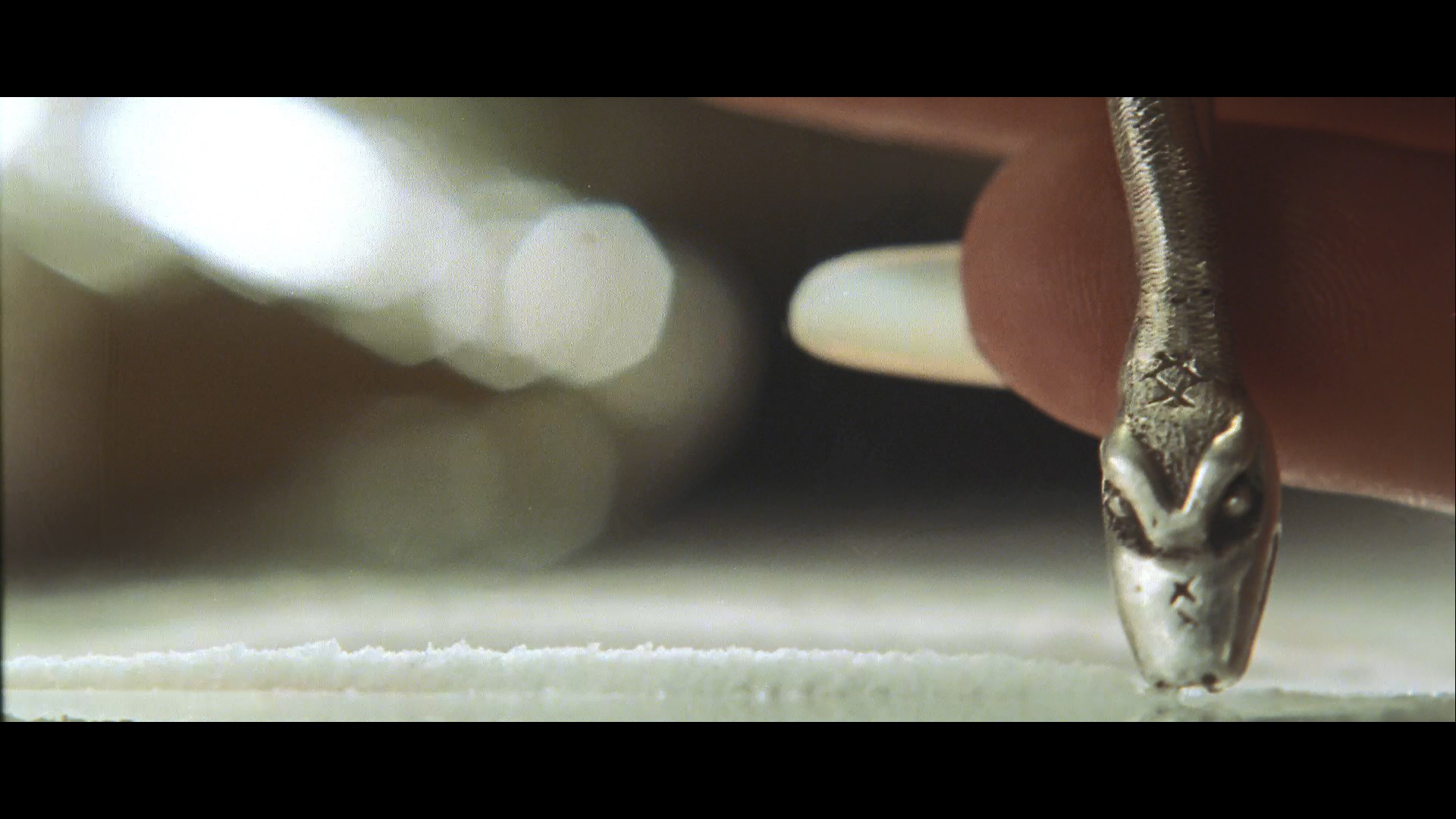

Updated review on March 23, 2021.



 calling card for its director and a key entry in the hip crime wave of the late 1990s, this ferocious adaptation of the novel/comic 59 Degrees and Raining: The Story of Perdita Durango by Barry Gifford (Wild at Heart) went through countless distribution
calling card for its director and a key entry in the hip crime wave of the late 1990s, this ferocious adaptation of the novel/comic 59 Degrees and Raining: The Story of Perdita Durango by Barry Gifford (Wild at Heart) went through countless distribution  and legal transformations on its way to the U.S. three years later. As jittery and confrontational as director (and onetime comic book artist) Álex de la Iglesia's previous two films, Accion Mutante and Day of the Beast (long before he went on to projects like 30 Coins and Witching and Bitching), this gritty and very effective blend of brutal crime antics and dark comedy finds its creator honing his craft thanks to a sharp script partially written by Gifford himself.
and legal transformations on its way to the U.S. three years later. As jittery and confrontational as director (and onetime comic book artist) Álex de la Iglesia's previous two films, Accion Mutante and Day of the Beast (long before he went on to projects like 30 Coins and Witching and Bitching), this gritty and very effective blend of brutal crime antics and dark comedy finds its creator honing his craft thanks to a sharp script partially written by Gifford himself.  more sensitive roles in Jamón Jamón and Live Flesh. Aimee Graham (yes, Heather's sister) plays one of the hostages and is clearly game for whatever the script throws at her, while supporting roles include some surprising faces like British director
more sensitive roles in Jamón Jamón and Live Flesh. Aimee Graham (yes, Heather's sister) plays one of the hostages and is clearly game for whatever the script throws at her, while supporting roles include some surprising faces like British director  and spaghetti western enthusiast Alex Cox. Incidentally, the characters of Perdita and Santos also appeared in both the novel and film of Wild at Heart, which means you can program this as a kind of odd semi-sequel to the David Lynch film.
and spaghetti western enthusiast Alex Cox. Incidentally, the characters of Perdita and Santos also appeared in both the novel and film of Wild at Heart, which means you can program this as a kind of odd semi-sequel to the David Lynch film.  beautiful anamorphic transfer; the only debit is the English subtitles must be manually switched on and off during the Spanish language scenes or left on for the film’s entirety. The Dolby Digital mix
beautiful anamorphic transfer; the only debit is the English subtitles must be manually switched on and off during the Spanish language scenes or left on for the film’s entirety. The Dolby Digital mix  for either version is a real room shaker, with the thunderous Latin-flavored score simmering from every speaker throughout the film. The U.S. disc features optional English subtitles which turn on by default for the Spanish language sequences, as well as a Spanish subtitle option. The original excellent European and Mexican trailers are included, as well as the less impressive video trailer (which "introduces" Bardem for some reason). The German disc also includes optional German subs, a photo gallery, cast bios, and the German and English language trailers, as well as a striking cover. A more stripped-down U.K. version eventually turned up complete from Metrodome after some BBFC wrangling during the original release, and an Italian DVD straggled along later as well.
for either version is a real room shaker, with the thunderous Latin-flavored score simmering from every speaker throughout the film. The U.S. disc features optional English subtitles which turn on by default for the Spanish language sequences, as well as a Spanish subtitle option. The original excellent European and Mexican trailers are included, as well as the less impressive video trailer (which "introduces" Bardem for some reason). The German disc also includes optional German subs, a photo gallery, cast bios, and the German and English language trailers, as well as a striking cover. A more stripped-down U.K. version eventually turned up complete from Metrodome after some BBFC wrangling during the original release, and an Italian DVD straggled along later as well.  saturated, comic-style colors and frequently heavy contrast) with some extreme focus shifting and intentional softness in some parts of
saturated, comic-style colors and frequently heavy contrast) with some extreme focus shifting and intentional softness in some parts of  the frame, so that's not a debit of the transfer. The Blu-ray is no slouch either, sporting richer colors than the Spanish disc and also looking less processed by comparison. The framing shifts a bit throughout by comparison on the horizontal edges, but only to a very minimal degree. The standard English track is presented in a very robust DTS-HD MA 5.1 mix with English subtitles for the Spanish-language scenes, plus English SDH subtitles and an alternate Spanish track (also DTS-HD 5.1). Both the UHD and Blu-ray contain two trailers, with the Blu-ray housing the rest of the bonus features. In "On the Border" (28m12s), de la Iglesia looks back on the film from its inception (originally to be directed by Bigas Luna with a heavier political bent) through the process of scouting and then shooting, including some fun stories about the cast (with some choice bits about Gangolfini and Cox). "Writing Perdita Durango" (16m43s), Gifford explains the process of how the story came out of his "dark subconscious" after Wild at Heart with the Perdita character necessitating her own book, a process that led to his involvement in ushering it to the big screen with a friendship forming with Luna (who brought in
the frame, so that's not a debit of the transfer. The Blu-ray is no slouch either, sporting richer colors than the Spanish disc and also looking less processed by comparison. The framing shifts a bit throughout by comparison on the horizontal edges, but only to a very minimal degree. The standard English track is presented in a very robust DTS-HD MA 5.1 mix with English subtitles for the Spanish-language scenes, plus English SDH subtitles and an alternate Spanish track (also DTS-HD 5.1). Both the UHD and Blu-ray contain two trailers, with the Blu-ray housing the rest of the bonus features. In "On the Border" (28m12s), de la Iglesia looks back on the film from its inception (originally to be directed by Bigas Luna with a heavier political bent) through the process of scouting and then shooting, including some fun stories about the cast (with some choice bits about Gangolfini and Cox). "Writing Perdita Durango" (16m43s), Gifford explains the process of how the story came out of his "dark subconscious" after Wild at Heart with the Perdita character necessitating her own book, a process that led to his involvement in ushering it to the big screen with a friendship forming with Luna (who brought in  Bardem, of course) and the interim also leading to a potential directing job for
Bardem, of course) and the interim also leading to a potential directing job for  Pedro Almodóvar. Interestingly, he also notes how going back and adhering closely to the book may have been a mistake in the long run, and he shares an interesting peek in how the most memorable song in the film came about. In "Dancing with the Devil" (12m57s), Rebekah McKendry waxes enthusiastic about de la Iglesia's cinema and how this film fits in with his unusual, frequently violent genre-twisting approach. "Necrosatanicos: Perdita Durango and the Matamoros Cult" (18m14s) with Abraham Castillo Flores and Cauldron of Blood author Jim Schutze is quite illuminating as it examines how real religious practices were distorted into a real, notorious 1989 crime fueled by black magic and drug use that influenced the storyline. It's a wild, disturbing story complete with some video coverage of the actual incident. Longtime genre favorite composer Simon Boswell turns up in "Canciones de Amor Maldito" (21m13s) to relate how his early work for Dario Argento and Michele Soavi led to him getting the gig on this film, with a trip to Madrid leading to the creation of the effective score. His bit about the reasoning behind that very familiar Herb Alpert tune is great, too. Finally, "Shooting Perdita Durango" (4m54s) is a quick chat with director of photography Flavio Labiano about approaching the shooting conditions in Mexico versus the United States.
Pedro Almodóvar. Interestingly, he also notes how going back and adhering closely to the book may have been a mistake in the long run, and he shares an interesting peek in how the most memorable song in the film came about. In "Dancing with the Devil" (12m57s), Rebekah McKendry waxes enthusiastic about de la Iglesia's cinema and how this film fits in with his unusual, frequently violent genre-twisting approach. "Necrosatanicos: Perdita Durango and the Matamoros Cult" (18m14s) with Abraham Castillo Flores and Cauldron of Blood author Jim Schutze is quite illuminating as it examines how real religious practices were distorted into a real, notorious 1989 crime fueled by black magic and drug use that influenced the storyline. It's a wild, disturbing story complete with some video coverage of the actual incident. Longtime genre favorite composer Simon Boswell turns up in "Canciones de Amor Maldito" (21m13s) to relate how his early work for Dario Argento and Michele Soavi led to him getting the gig on this film, with a trip to Madrid leading to the creation of the effective score. His bit about the reasoning behind that very familiar Herb Alpert tune is great, too. Finally, "Shooting Perdita Durango" (4m54s) is a quick chat with director of photography Flavio Labiano about approaching the shooting conditions in Mexico versus the United States. 








